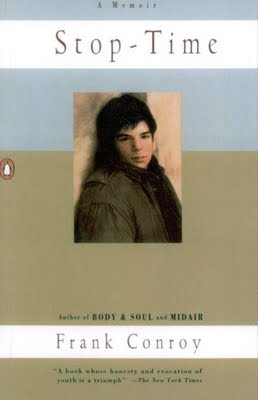If Memory Serves

In the rapidly disappearing bookstores on the boulevards of America, the memoir has become as ubiquitous as rain. We can read the words and memories of autistic children, progeny of drunks and acrobats, the woman who made her way through Harvard by sleeping in the library. It is a rich and varied story, the memoir, shaped by elements of fiction and narrative, and often treading heavily on the border between truth and illusion. “This is my story, the way I saw it, the way I believe it happened to me, and if you don’t remember it that way, write your own book!” Most readers do not realize that much of the overheated prose simmered in the juices of reflection can be traced back to one book: Stop-Time by Frank Conroy (Penguin, 1977) originally published in 1967. The book was an instant classic, a finalist for the National Book Award. Conroy went on to write novels and essays, even doctored some screenplays, but he never achieved the level of success of his memoir. He became the direct

